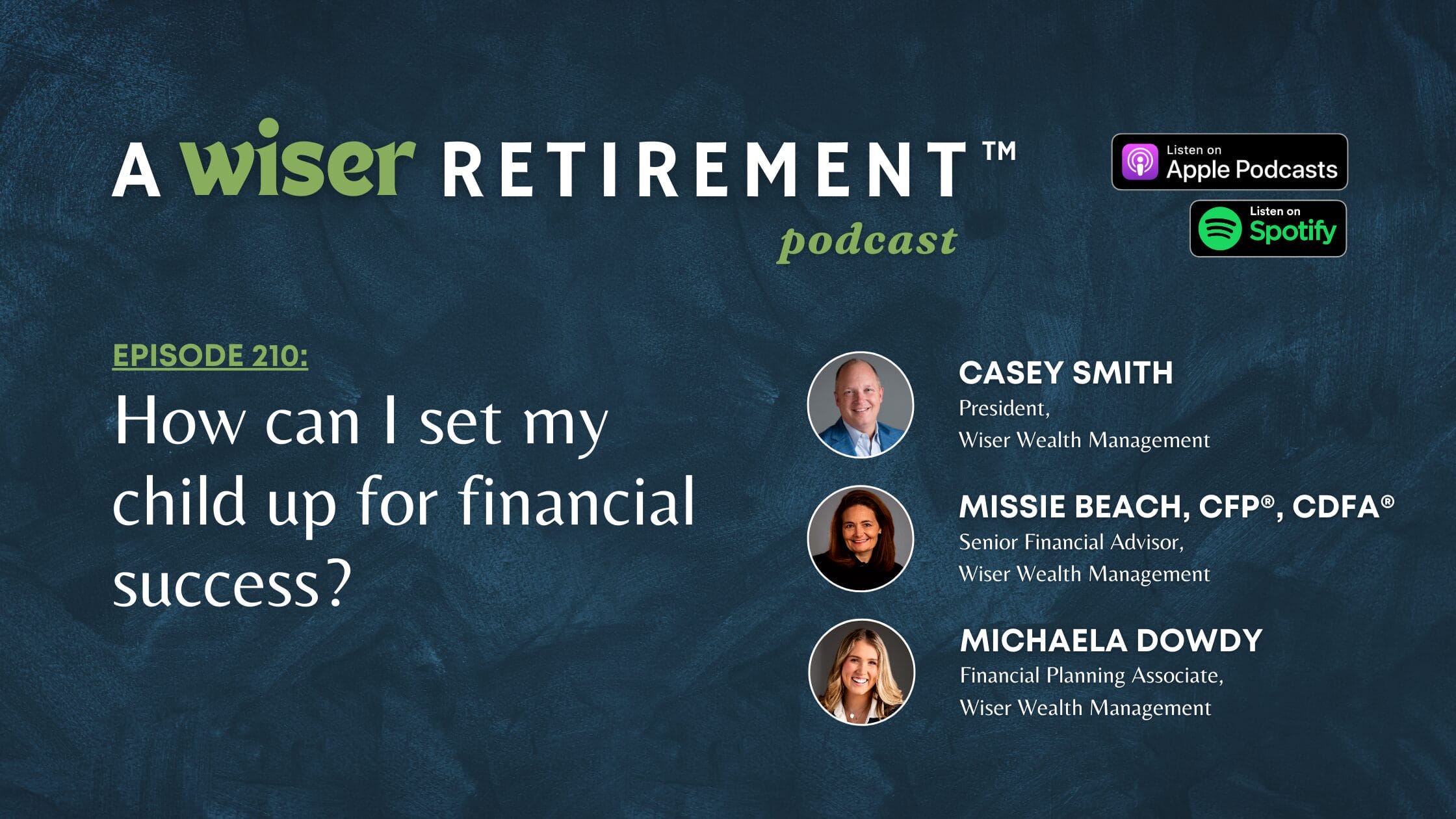
How can I set my child up for financial success?
On this episode of A Wiser Retirement™, we talk about strategies for educating your children on money management, credit, investing, and saving to pave the way for their financial success with Casey Smith, Missie Beach, CFP®, CDFA®, Senior Financial Advisor, and Michaela Dowdy, Financial Planning Associate.
Listen or Watch:
Summary
Start Financial Education Early
Use age-appropriate methods to teach them about saving, spending, and the value of money.
Lead by Example
Be mindful of how you manage your finances in front of your kids. When they see you practice good financial habits, they will be more likely to emulate them.
Open a Savings Account in Your Child’s Name
Teach them how to make deposits and monitor their bank account balance. Discuss the concept of interest and how their money can grow over time.
Teach Them About Investing
Use simple terms to explain how investing works and why it’s important. There are even apps and games designed to teach children about the stock market and investing in a fun and engaging way.
Encourage Them to Set Financial Goals
Help your child set achievable financial goals, whether it’s saving for a new toy, a college fund, or a charitable donation. This teaches them the value of saving over spending and helps them make more thoughtful financial decisions.
Give Them an Allowance
Giving your child an allowance will help teach them financial responsibility. Encourage them to save a portion, spend some wisely, and maybe even donate a part to teach them about generosity.
Discuss College and Career Planning
Discussing college and career planning with your children is crucial for several reasons, as it prepares them for a successful future, helps them make informed decisions, and supports their overall development.
Links:
- Click here to download one of our free guides that covers financial planning topics like retirement, investing, taxes, divorce, and more!
Connect:
- Click here to schedule a consultation with one of our financial advisors.
- Follow us on social media: Twitter, Instagram, Facebook, LinkedIn, and YouTube.
- Learn more about A Wiser Retirement™ podcast and access previous episodes.
Share This Story, Choose Your Platform!
Wiser Wealth Management, Inc (“Wiser Wealth”) is a registered investment adviser with the U.S. Securities and Exchange Commission (SEC). As a registered investment adviser, Wiser Wealth and its employees are subject to various rules, filings, and requirements. You can visit the SEC’s website here to obtain further information on our firm or investment adviser’s registration.
Wiser Wealth’s website provides general information regarding our business along with access to additional investment related information, various financial calculators, and external / third party links. Material presented on this website is believed to be from reliable sources and is meant for informational purposes only. Wiser Wealth does not endorse or accept responsibility for the content of any third-party website and is not affiliated with any third-party website or social media page. Wiser Wealth does not expressly or implicitly adopt or endorse any of the expressions, opinions or content posted by third party websites or on social media pages. While Wiser Wealth uses reasonable efforts to obtain information from sources it believes to be reliable, we make no representation that the information or opinions contained in our publications are accurate, reliable, or complete.
To the extent that you utilize any financial calculators or links in our website, you acknowledge and understand that the information provided to you should not be construed as personal investment advice from Wiser Wealth or any of its investment professionals. Advice provided by Wiser Wealth is given only within the context of our contractual agreement with the client. Wiser Wealth does not offer legal, accounting or tax advice. Consult your own attorney, accountant, and other professionals for these services.





